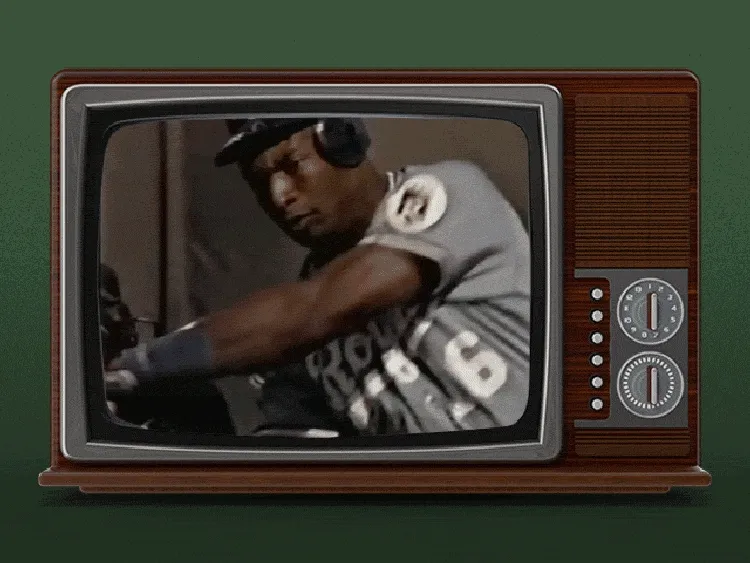Bo Jackson might not have known advertising like he knew football and baseball, but he’s partially responsible for cementing Nike as one of the global powerhouse brands of the 21st century.
Today, Jackson is most known for playing two sports professionally at the same time. He was hamstrung by an injury in the early ’90s that shortened his career, but he’d taken on an almost mystical presence in the minds of sports fans, wrote Jeff Pearlman, author of a new biography about Jackson called The Last Folk Hero: The Life and Myth of Bo Jackson.
Part of that legacy includes his stint as a spokesperson for Nike’s Air Trainer, a cross-training brand. An unlikely spokesperson, who Pearlman describes in the book as “still struggling with stuttering” and as “largely void of charisma,” Nike took full advantage of Jackson’s star power in the late ’80s and early ’90s, running a campaign called “Bo Knows” that ended up becoming one of its most iconic.
“The idea of a guy playing two sports was like, riveting, like, beyond riveting…and the Nike ad just exploded,” Pearlman told Marketing Brew. Phil Knight, co-founder and former CEO of Nike, told Pearlman that he considers it the second most important advertising campaign in Nike’s history, behind Air Jordan.
“Jordan really ushered in the idea of the shoe attached to the personality,” Pearlman said. “The Bo Jackson cross-trainer, in a lot of ways, took that and almost perfected it.”
The backstory
In 1987, Nike debuted the Air Trainer, a shoe designed for multiple sports.
“Man does not live by one sport alone,” reads a 1987 print ad for the shoe that featured then-Raiders defensive end Howie Long.
“We did a print insert first and said, ‘Oh, that was boring. Let’s look at this guy,” Jim Riswold, then a copywriter for Wieden+Kennedy, told Marketing Brew.
That guy was Bo Jackson, because who better to sell a cross-training shoe than a guy who’s playing two sports professionally?
The buy
After running three ads featuring Jackson, Riswold said that Nike decided to go all-in with a media buy during Major League Baseball’s 1989 All-Star Game in Anaheim, California, which Jackson was appearing in.
President Ronald Reagan was in the booth alongside broadcaster Vin Scully, providing commentary during the first inning. Jackson almost immediately crushed a home run, eventually securing the game’s MVP award.
Get marketing news you'll actually want to read
Marketing Brew informs marketing pros of the latest on brand strategy, social media, and ad tech via our weekday newsletter, virtual events, marketing conferences, and digital guides.
In between, around the fourth inning, the original “Bo Knows” ad ran. Featuring Wayne Gretzky, Jim Everett, and Kirk Gibson all paying homage to Bo, the spot concludes with Bo Diddley, a rock-and-roll legend in his own right, who, though unknown at the time to Pearlman (and likely any viewer under the age of 25), wisely ushers in the spot’s kicker after listening to Jackson try, wail, and fail on the guitar: “Bo, you don’t know Diddley.”
“It winds up being arguably the biggest ad rollout in sports history. He homers, and he wins the MVP of the game. Everything’s lined up perfectly,” Pearlman said, who said that Nike executives watched the game “dumbfounded” while eating dinner at Mickey Mantle’s restaurant in New York City. “‘Bo Knows’ became like ‘Just Do It,’” he said.
“God wears Nike”
Riswold, who also worked on Nike’s iconic campaigns with Michael Jordan, believes it was the “Bo Knows” campaign that helped Nike surpass then-competitor Reebok. “God wears Nike; everything fell into place,” he recalled telling a reporter at the time.
Almost. According to a New York Times story titled "Nike Is Bounding Past Reebok," published on the same day the "Bo Knows Diddley" ad ran, Nike was already gaining ground on Reebok. It said that Nike’s advertising strategy was “widely praised for its artfulness and clarity.”
A year later, Nike’s then-advertising manager, Bill Zeitz, told the paper that “Mr. Jackson’s commercials have played a big part in pumping up our sales…It’s hard to pinpoint exactly how, but since he’s been doing ads for our cross-training shoes, the sales have grown dramatically.”
The “Bo Knows” campaign continued for the next few years, even after he got injured. One featured Denis Leary admonishing fans for thinking his injury could be career-ending. Another featured Sonny Bono (get it, Bo knows, Sonny Bono?). “My goal was to make the worst joke in the history of advertising, and I fucking succeeded,” Riswold said.
Correction 11/3/22: In an earlier version of this article, the first paragraph said "basketball" instead of "baseball."
